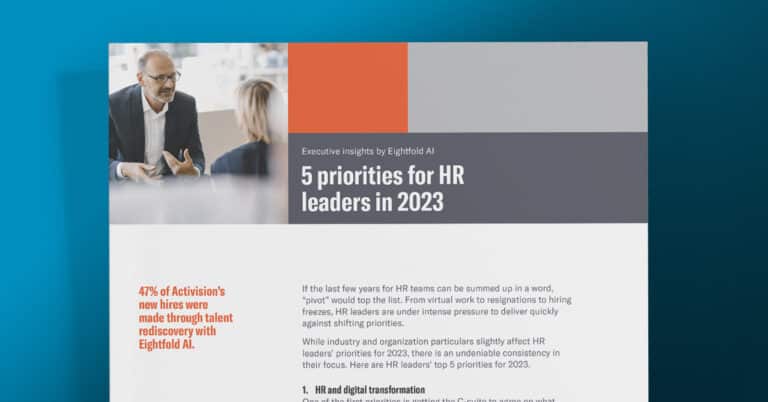
5 priorities for HR leaders in 2023
5 priorities for HR leaders in 2023
HR is essential to supporting overall business objectives and helping drive strategy and success for the organization. In this executive brief, we discuss the top five priorities for HR leaders in 2023 — and why investing in HR is essential to any organization’s growth:
Key takeaways summary:
- HR and digital transformation: C-suite and HR leaders need to align on what digital transformation means for their organization — and the best ways to approach it.
- Skills-based learning: Digital and other in-demand skills are in need, but labor shortages can impede growth. Find out how upskilling and reskilling can help.
- Holistic well-being: HR leaders need the power to support the overall health of employees.
- Employee experience: High-value employees expect more. It’s time to meet their needs.
- Workforce planning: HR leaders need full visibility of their workforce’s skill sets to enable better deployment and planning.
If the last few years for HR teams can be summed up in a word, “pivot” would top the list. From virtual work to resignations to hiring freezes, HR leaders are under intense pressure to deliver quickly against shifting priorities.
While industry and organization particulars slightly affect HR leaders’ priorities for 2023, there is an undeniable consistency in their focus. Here are HR leaders’ top 5 priorities for 2023.
1. HR and digital transformation
One of the first priorities is getting the C-suite to agree on what transformation means, how to drive it, and who should own it.
At its core, digital transformation is about giving people access
to what they need to excel in their roles, whether it’s technology, information, or data. For HR, that might mean helping employees access and track their HR-related information, or giving HR leaders on-demand data for important metrics like attrition or benefits usage.
2. Skills-based learning
Digital transformation requires in-demand digital skills, and HR
is responsible for building or buying the necessary talent. Upskilling current employees is a three to five year proposition while attracting, acquiring, and retaining already-skilled talent relies on organizations delivering a superior employee value proposition (EVP).
Beyond digital skills, HR leaders are looking for ways to build critical thinking, collaboration, and similar “soft” skills throughout their workforces. Not only does this type of skill-building elevate organizational performance, but it also helps meet employees’ desire for ongoing growth and learning.
3. Holistic well-being
The last few years have shown that well-being goes beyond physical health. Employees are looking for benefits that support the whole person — physically, mentally, financially, socially,
and professionally.
As a result, more HR organizations are actively surveying and listening to employees to guide their offerings. HR is simultaneously working on becoming more holistic itself, breaking down silos
that traditionally separated different functions, including talent acquisition, talent management, and workforce planning.
4. Employee experience
The pandemic made it clear that people want and expect to
be fulfilled in their careers — and they won’t hesitate to find that fulfillment elsewhere. This has led to a new emphasis on internal mobility, and enabling nontraditional and nonlinear career paths across the organization.
To facilitate this shift, there needs to be transparency for employees to understand different roles across the company and supporting tools to guide them toward the experiences, skills,
and learning materials that will help them reach their career goals.
5. Workforce planning
Leaders need full visibility into the skills of their workforces — and their competitors and industry — ideally delivered in real-time, easy-to-understand, shareable analytics that inspire action.
Making sense of several job descriptions and hierarchies that have sprung up over time with no real underlying job architecture is a daunting task. But it’s essential for enabling mobility and strategically thinking about talent based on the skills needed to perform jobs. This also involves pinpointing the best ways to build or buy those skills and deploy them.
HR’s role as a business driver underlies everything
HR’s role in enabling organizational performance was growing before the pandemic. Today, that role has doubled in importance and magnitude. HR leaders are in the hot seat to manage the fallout of the past few years — talent shortages, attrition, employee expectations for well-being, mobility, and more.
Organizations are realizing that they’ve underinvested in supporting HR to support everything they’re being asked to do. The need to evolve and be responsive to quickly shifting priorities and pressures isn’t going away. Championing greater investment in HR and backing up those asks with a strong business case should be, and is, on every CHRO’s agenda.
The Eightfold Talent Intelligence Platform
Attract, retain, and grow top talent with Eightfold’s deep-learning AI platform. We use the world’s largest global talent data set to provide unmatched clarity into internal and external talent so you can make confident decisions and drive real change across your organization with a single AI platform for all talent.
You might also like...
Get the latest talent news in your inbox every month
By submitting this form, I consent to Eightfold processing my personal data in accordance with its Privacy Notice and agree to receive marketing emails from Eightfold about its products and events. I acknowledge that I can unsubscribe or update my preferences at any time.
